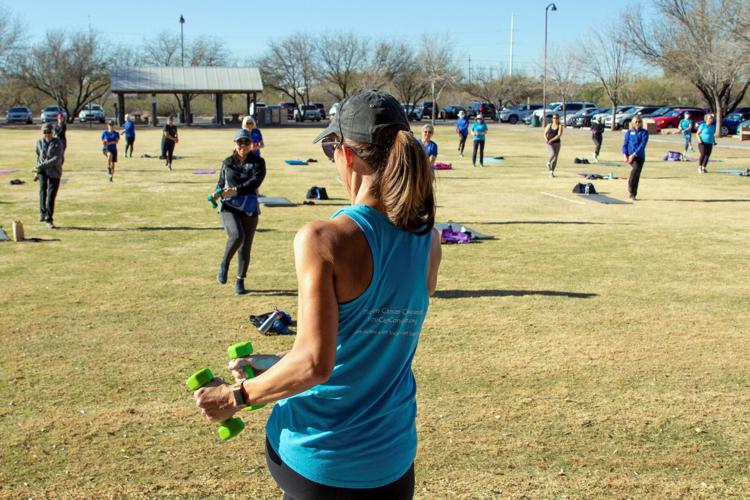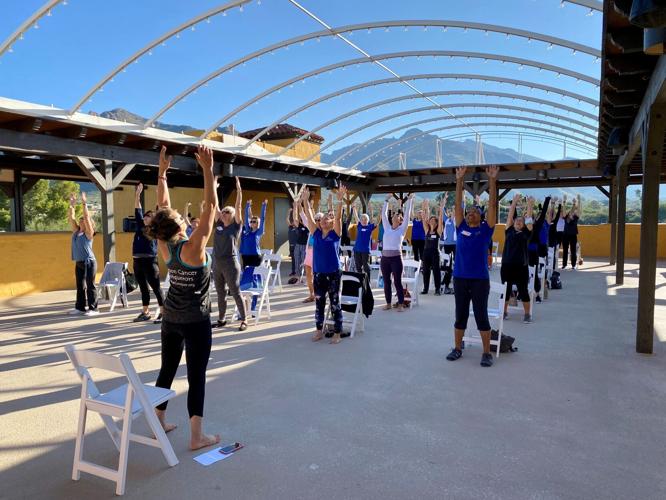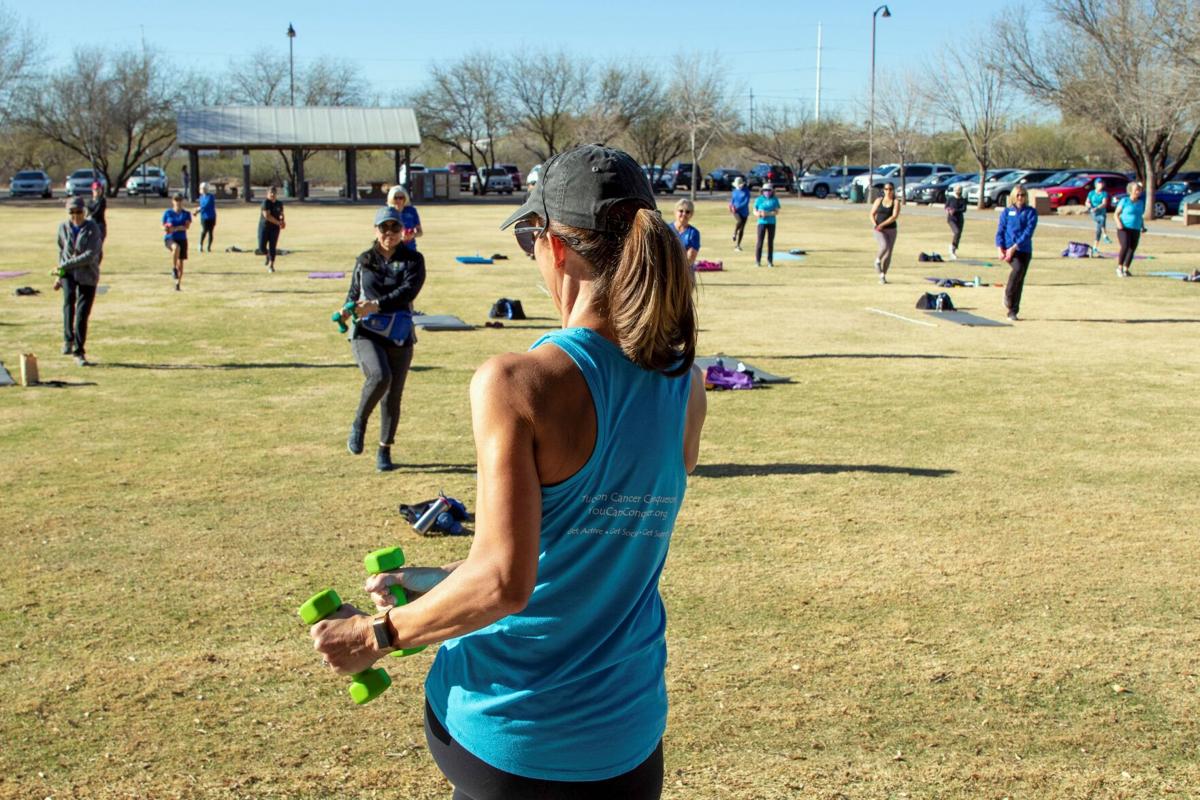Sonia Massoud, a nurse for 14 years and resident of Tucson, was diagnosed with breast cancer in 2001.
She attended her annual mammogram appointment in February of that year, and everything was normal until she scratched an itch on her chest two months later. That’s when she found lumps. Massoud said she was convinced it was a cyst but then received her breast cancer diagnosis.
“I got an email that I got a new result in a pie chart, and I was like OK, great. I sat there and I read it at a light on my way to work. So that was a little nerve-wracking for me,” Massoud said.
Massoud’s first thought was about her daughter, she said, who was 8 at the time. She said it was difficult to find the right time to tell her, but she found out on her own after overhearing Massoud.
Massoud said she reassured her that everything would be fine, but as a single mom, she also worried about what might happen if she died.
“What would I do? That was not an option though,” Massoud said. “I’m just going to do whatever the doctor tells me.”
Massoud’s mother was a nurse and instilled in her an instinct to get health issues “taken care of,” so she knew she needed to get the lump checked out immediately.
However, as a nurse herself, Massoud said she’s had patients who are reluctant to see their doctor. Massoud said that she understands the fear, but it’s important to get examined anyway.
“You have better outcomes and prognosis if you go. As scary as it is to find out, it’s scarier when you have less options because you waited,” Massoud said.
Andrea Casillas, a research grants manager at the patient advocacy organization Susan G. Komen, said breast cancer risk is particularly high for women in the Hispanic community.
Breast cancer is the most common form of cancer in Pima County, and although breast cancer-related deaths have declined by 43% from 1989 to 2020, breast cancer is currently the leading cause of cancer-related death for Hispanic women in the United States.
Yet according to the CDC, Hispanic women were less likely to have had a mammogram in the past two years at 64.6% compared to white women, 71.2%.
Casillas said the foundation has observed a cultural taboo in the Hispanic community when discussing breast cancer, something she said she’s noticed herself as a Mexican American. For instance, in Mexico, breast cancer is called ‘cáncer de mama’ or ‘mother’s cancer’ rather than ‘cáncer de senos,’ the Spanish translation of breast cancer.
Casillas said the organization is trying to change the image of breast cancer from something taboo to thinking of the illness clinically.
“It’s important to destigmatize,” Casillas said. “It’s not dirty words, it’s important in our health.”
This shift is needed, Casillas said, because having open conversations with relatives about their family’s cancer history can save lives. Breast cancer deaths are often linked to finding the cancer at a late stage, and although Casillas addressed the importance of getting mammograms, she said it’s equally important for women to know their health information.
She said if they discover a first-degree relative of theirs, a parent, sibling or child, is diagnosed, Komen recommends that everyone in the family gets tested to make sure they don’t have breast cancer, as well. Casillas said this advice is relevant for all families and communities.
Finding support
Unfortunately, not everyone has generational knowledge or a record of their medical history. This is often the case for people experiencing poverty, and financial limitations play a powerful role in survivability. Women with a household income 2.5 times less than the poverty level were 1.44 times more likely to die of breast cancer than women whose household income was five or more times greater than the poverty level.
Casillas said Komen is combating economic disparities with a financial assistance program. Women with stage 0 to 3 breast cancer can receive $500 in assistance if they are 300% percent of the federal poverty level or below, and women with stage four breast cancer can receive $750.
“One of the hurdles women have in breast cancer treatment may just be money and we don’t want that to impact their health,” Casillas said.
Komen also staffs a free helpline from 9 a.m. to 10 p.m. Eastern time, Monday through Friday. The helpline is available in English and Spanish; Casillas said having someone who understands one’s native language and cultural competency while they’re navigating a difficult diagnosis like breast cancer can make the process more manageable.
Casillas has been raising money for The Susan G. Komen three-day fundraiser in Denver, where participants each raise at least $2,000 and walk 60 miles over three consecutive days. Last year she raised about $2,500. Currently, she’s made 20% of her goal and said she’s planning to raise the rest before the walk in August.
A local nonprofit organization is also working to help cancer patients and survivors in Tucson. The all-volunteer-based organization, Tucson Cancer Conquerors (TCC), was started by a group of women, including the president of the TCC and anesthesiologist Dr. Elizabeth Almli.
Almli was diagnosed with breast cancer in 2005. She felt a lump in her chest, and when she had it checked out, the doctors told her they thought it was a cyst and she needed to follow up in six months. Almli said she wasn’t comfortable waiting and had the lump removed. She was shocked to discover the lump was not a cyst but an aggressive invasive ductal carcinoma, cancer in the milk duct.
“I’ve been involved in the care of cancer patients ever since I started doing anesthesia, I just didn’t ever think I would be one,” Almli said.
She had a bilateral mastectomy where her breasts were removed, had reconstruction, and finished her chemo 17 years ago. Almli found community through exercising with a group of friends also going through cancer. After getting personal training certifications and discussing expanding the group, they applied for and received nonprofit status in 2014.

Members of Tucson Cancer Conquerors take part in rooftop yoga as part of a health and wellness retreat.
“I know for me I was like, I don’t need a support group, I’m a doctor and I’m busy, but when I started exercising with people, that was my support group,” Almli said. “It didn’t have to be cancer, it was making a connection with people who were my friends, who understood me.”
Exercise is still one of the group’s objectives, as exercising can help during treatment and lower a person’s rate of cancer recurrence. However, volunteers have contributed to a long list of activities for members, from mindful hiking to conversations over coffee. What started as a small exercise group has grown to about 140 members, Massoud being one of them.
Massoud said the group took away her fear of being alone. She didn’t know anyone who’d experienced cancer, but through the TCC, she’s found social support, education about cancer and how to maintain a healthy survivorship.
“Some of these women in the group, they remind you of your grandma,” Massoud said. “You just love them to pieces and you’re like, oh my gosh, you’re 80 and you survived this 20-some years ago, which means I can do this.”
To learn more about the Susan G. Komen Foundation, its support programs or to donate, visit komen.org.
To learn more about Tucson Cancer Conquerors, visit tucsoncancerconquerors.org.






